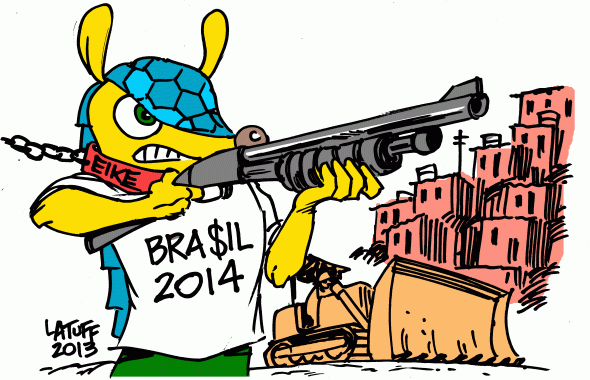This interview, by Marcela Genaro, entitled “O banco imobiliário da Cabralândia” [pt], is part of Brazilian investigative journalism agency Pública's special #CopaPública coverage and was originally published on March 22, 2013, the day of the eviction of the Maracanã indigenous village in Rio de Janeiro.
Cartoonist Carlos Latuff is not optimistic about the transformation that the city of Rio de Janeiro is undergoing to host the 2014 World Cup and 2016 Olympics:
Vai ajudar exatamente quem? Certamente o Eike Batista, a Coca-Cola, as grandes corporações que estão por trás disso. Mas o Zé Povinho, certamente não.
Exactly who is it going to help? Certainly Eike Batista, Coca-Cola, the big corporations that are behind it, but your average Joe, certainly not.
This 44-year-old Rio de Janeiro native, known for defending humanitarian causes with his simply drawn and dark humored cartoons, gave an interview to Pública in which he analyzed the preparations happening in Rio, which he calls “the ex-Marvelous City”, for the mega-event:
É uma ofensiva da especulação imobiliária. Ela agora pode avançar porque existe esse respaldo, que se trata de uma “coisa justa”, que vai promover a cidade lá fora. Acho que não foi à toa que a prefeitura lançou o jogo que é o Rio de Janeiro como banco imobiliário. Aquilo ali foi o melhor de todos os indicativos. Se a gente está falando de banco imobiliário não se trata dos interesses do cidadão que pega ônibus, que pega barca, pega trem. A gente está falando dos interesses dos players.
It's an onslaught of real estate speculation. It can go ahead now because there is this support, that there is “just cause”, that will promote the city internationally. I don't think it was by coincidence that the the city government came out with the Rio de Janeiro Monopoly board game. That was one of the biggest clues. If we are talking about Monopoly, we are not talking about the interests of the citizen who rides the bus, the ferry, the train. We are talking about the interest of the “players”.
The Olympic City Monopoly board-game, created by the manufacturer Estrela, features recent city construction projects. The city acquired 20,000 copies of the game, at a cost of 1,050,748 Brazilian reais (about 515,325 US dollars) to distribute to public schools. The public prosecutor's office is looking into whether there are irregularities in the purchase of the game, which would promote the government, as a teaching material.
Latuff also talked about the forced evictions of entire communities caused by the World Cup preparations and compared it to the idea of urban renewal promoted by engineer Francisco Pereira Passos, who served as mayor of Rio between 1902 and 1906. His reform was popularly known as “the teardown” and was marked by the “sanitization” of Rio de Janeiro for its removal of communities:
De fato o Rio de Janeiro não é um tabuleiro e nem um brinquedo. Tem sido tratado como tal, mas as pessoas que moram em favelas, nos quilombolas, nas áreas indígenas sabem que isso não é brincadeira. Remoção não é brincadeira, muito longe disso.
Really, Rio de Janeiro is not a board and not a toy. It has been treated as such, but people who live in the slums, in the quilombos (Afro_Brazilian slave descended communities), in indigenous areas know that this is no joke. Removal is no joke, far from it.

Mascot of the 2014 World Cup by Carlos Latuff for Agência Pública. Eike [Batista] is a Brazilian businessman and one of the 10 richest people in the world.
Tinha feito um desenho que era o mascote do Pan, Cauê, segurando um fuzil, dando um tiro para o alto com uma M16, uma favela ao fundo e um caveirão. Sob a alegação de que eu estava usando um desenho que era protegido por direitos autorais, fui chamado para prestar um depoimento numa delegacia. A polícia foi até a minha casa com uma intimação.
I had created a drawing that was the mascot, Cauê holding a rifle, shooting into the air with an M16, a slum in the background and an armored police vehicle. On the grounds that I was using a design that was copyrighted, I was called to testify in a police station. The police came to my house with a subpoena.
Latuff was not intimidated. In the cartoon produced for the Pública agency at the end of the interview, again the protagonist is the mascot, this time of the World Cup.
Check out the video interview with the cartoonist, who continues to push so that Brazilians recognize the other side of these mega-events:
Eu espero que haja um despertar de consciência, que a ficha caia e que as pessoas não comprem esse gato por lebre.
I hope there is an awakening of consciousness, that it hits home and people do not buy this pig in a poke.
The organizations responsible for administering the funds for the 2014 World Cup and the 2016 Olympics need to take responsibility for their actions, and if there is anything we can do, it is to make it clear now and forever, who they are, and who were the ones responsible.
The testimony of Carlos Latuff is particularly important because it hits a societal sore spot, and even if there isn't a convergence of goals between the parts of society at least each individual opinion is clear and recorded.
Latuff, whose cartoons have illustrated many articles for Global Voices Online, can be found on Twitter (@CarlosLatuff), Facebook, and his blog (all in Portuguese).







4 comments
http://blogbeamin.blogspot.com/2013/06/a-teacher-is-worth-more-than-neymar.html?showComment=1371744893241#c8132021897269148599
I am so interested in learning more about the factors that led to this??
We have horrible global awareness here in America…HELP
http://blogbeamin.blogspot.com/2013/06/a-teacher-is-worth-more-than-neymar.html?showComment=1371744893241#c8132021897269148599